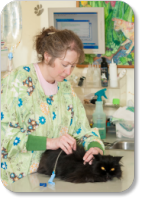Chronic condition care
Not too long ago, if your cat had a chronic condition, the outlook was grim. Today, if caught early, chronic conditions – arthritis, diabetes, heart and kidney disease, pancreatitis and thyroid disease -- can be easily treated and managed with the right combination of good nutrition and medication. Cats with these conditions, that receive ongoing supportive care at home, can live long, happy and comfortable lives.
The Cat Practice helps cat families provide supportive HOME CARE to their felines. We assist cat families in learning how to administer medications and fluid therapy, if needed. A pet that remains in comfortable and familiar surroundings is much more likely to respond to supportive treatment and care. Plus, it saves cat families money on hospitalization and veterinary care.
Our advanced diagnostics provide us – and cat families – with information for making informed decisions. See more about serious feline illness detection below. In all cases, there are treatment OPTIONS. One option is to treat your cat’s condition aggressively and do whatever you can to limit progress of the condition and ensure the highest quality of life for your pet. Another option is to treat only the condition’s symptoms and to keep your pet comfortable.

Licensed Veterinary Technician, Laura Kramek, administers fluids to a patient.
It’s important that cat families understand these choices and pick the right treatment plan that makes the most sense for them and their pet. You will want to understand and ask your veterinarian about:
-
Treatments costs
-
Your cat’s quality of life
-
Your cat’s age and health history
-
Supportive care that you provide at home
SUPPORTIVE CARE THAT YOU PROVIDE AT HOME
Families of cats with chronic conditions – such as arthritis, diabetes, heart and kidney disease, pancreatitis and thyroid disease – can help manage their pet’s illness within the comfort of your home. Supportive care that you provide includes:
-
Administering fluids, if needed, for hydration
-
Administering medication
-
Watching out for nutritional needs
-
Providing for comfortable and comforting surroundings
The Cat Practice provides cat families with the support that THEY NEED in caring for their pet.
This includes:
- Instruction to the family on administering medication and fluids
- Ongoing guidance whenever needed
- Phone consultations with veterinary nurses (licensed veterinary technicians)
- Emotional support and encouragement
We want your cat to be happy and comfortable, and want to make his or her treatment possible with the least amount of stress to you both!
Serious feline illness detection:
|
Illness |
Symptoms |
How detected |
|
Renal (kidney) disease |
Decreased appetite, weight loss, increase in drinking and/or urination. |
Blood work, urinalysis. |
|
Hyperthyroidism |
Increased appetite, weight loss, increase in drinking and/or urination, more active/vocal. |
Blood work. |
|
Diabetes |
Appetite changes, weight loss, increase in drinking and/or urination. |
Blood work, urinalysis. |
|
Pancreatitis/Intestinal disease |
Decreased appetite, weight loss, vomiting, diarrhea. |
Blood work, abdominal ultrasound. |
|
Cancer/Lymphoma |
Decreased appetite, weight loss, vomiting, diarrhea. |
Abdominal ultrasound, surgical biopsy. |
|
Heart disease |
Usually none unless in end-stage heart failure when symptoms include labored breathing, coughing, exercise intolerance, sudden loss of function in hind legs. |
Echocardiogram (ultrasound of the heart). |
|
Arthritis |
Stiffness after napping, hesitancy to jump up or down, stilted gait, limping or lameness in extreme cases. |
Radiographs (x-rays), palpation of joints. |


